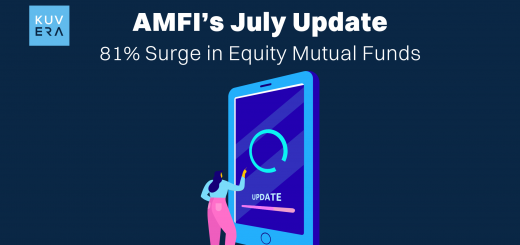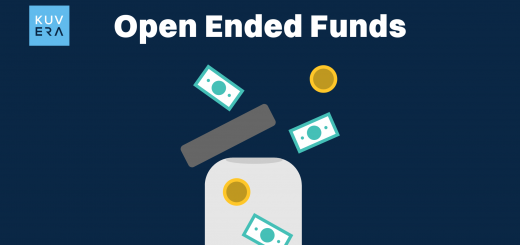Investing in equity vs debt funds can be intimidating, especially when you are just starting. How do you choose what’s right for you? One of the biggest decisions you will face is whether to invest in equity mutual funds or debt mutual funds. Both have their benefits and limitations. Let’s understand which option match with your financial goals.
What are Equity Funds?
Equity funds are mutual funds that primarily invest in stocks of various companies. When you invest in an equity fund, you are buying a small piece of many companies. The goal is to generate wealth over time as the companies grow and their stock prices increase as the industry grows. However, since stock prices can be volatile, equity funds are considered higher-risk investments which offer the potential for higher returns as compared to other mutual funds.
What to Remember about Equity Funds?
1. Higher Risk, Higher Reward
Equity funds are suitable for long-term goals, as they have the potential to provide higher returns over time as compared to other types of mutual funds.
2. Volatility
The stock market’s ups and downs mean that the value of equity funds can fluctuate significantly in the short term.
3. Types of Equity Funds
They include large-cap (investing in well-established companies), mid-cap and small-cap funds (investing in smaller, potentially faster-growing companies).
Start investing in Index Funds.
What are Debt Funds?
Debt funds, on the other hand, invest in fixed-income securities like bonds, treasury bills and government securities (G-Secs). These funds are safer as compared to equity mutual funds. They also provide more stable returns compared to equity funds. They are a good option for those who prefer a lower-risk investment strategy.
What to Remember about Debt Funds?
1. Lower Risk, Steady Returns
Debt funds are less volatile and provide more consistent returns. This makes them suitable for your short-term and medium-term goals. Such as buying a car or saving up for a vacation.
2. Interest Rate Sensitivity
The returns on debt funds can be influenced by changes in interest rates. It affects the value of the bonds they hold, hence the returns on such funds might fluctuate.
3. Types of Debt Funds
The options in debt mutual funds include liquid funds (ideal for very short-term goals) and long-term debt funds (better for goals spanning for several years).
How to Choose Between Equity and Debt Funds
Now that you know the what equity and debt funds are, it’s time to choose the right kind of funds for you. Your choice depends on many factors, your investment period, risk tolerance and financial goals.
1. Investment Duration
Short-Term (up to 5 years): Debt funds are typically better as they offer stability and lower risk.
Long-Term (7 years or more): Equity funds are generally preferred due to their potential for higher returns.
2. Risk Tolerance
Low-Risk Tolerance: Debt funds are safer and less volatile.
High-Risk Tolerance: Equity funds can offer higher returns, but you need to be comfortable with market fluctuations.
3. Financial Goals
Income Generation: If you’re looking for a steady income, debt funds are more reliable.
Wealth Creation: For those aiming to build significant wealth over time, equity funds are more suitable.
What are the Taxes Implied on Equity and Debt Funds?
Understanding how your equity and debt funds are taxed is crucial. Here’s a quick comparison:
1. Equity Funds
Long-Term (funds held for over 12 months): Long-term gains on equity funds are taxed at 12.5% if they exceed ₹1.25 lakh in a financial year.
Short-Term (funds held for 12 months or less): Gains are taxed at a flat rate of 20%.
2. Debt Funds
Long-Term (funds held for over 24 months): Gains are taxed at your income tax slab after indexation, which adjusts for inflation.
Short-Term (funds held for less than 24 months): Gains are taxed according to your income tax slab.
FAQs
Which is better, debt fund or equity fund?
It all depends on your financial goals. Debt funds are better for short-term stability, while equity funds are better for long-term growth.
Can I invest in both equity and debt mutual funds simultaneously?
Yes, diversifying your investments between equity and debt funds can help balance risk and returns.
Which is riskier, equity or debt?
Equity funds are riskier due to stock market volatility, while debt funds offer more stability.
What is the tax treatment for equity vs debt funds?
Equity funds have favourable tax treatment for long-term gains, while debt funds offer indexation benefits after three years.
Is SIP better in equity or debt funds?
For long-term goals, SIP in equity funds is better due to its higher return potential. For short-term goals, SIP in debt fund is a safer bet to choose from.
What type of investor should choose equity funds?
Equity funds are for investors who have a higher risk appetite and long-term financial goals.
What type of investor should choose debt funds?
Debt funds are ideal for conservative investors who are looking for steady returns and capital preservation.
Do equity funds guarantee returns?
No, equity funds do not guarantee returns as they are subject to market risks.
Are debt funds risk-free?
No investment is entirely risk-free. Debt funds carry risks, especially related to interest rates and credit quality.
Interested in how we think about the markets?
Read more: Zen And The Art Of Investing
Watch here: Investing In Passive Funds
Start investing through a platform that brings goal planning and investing to your fingertips. Visit kuvera.in to discover Direct Plans of Mutual Funds and Fixed Deposits and start investing today.
AREVUK Advisory Services Pvt Ltd | SEBI Registration No. INA200005166
DISCLAIMER: Mutual Fund investments are subject to market risks. Read all scheme related documents carefully. Registration granted by SEBI, membership of BASL (in case of IAs) and certification from NISM in no way guarantee performance of the intermediary or provide any assurance of returns to investors. Investments in securities market are subject to market risks. Read all the related documents carefully before investing. The securities quoted are for illustration only and are not recommendatory.












